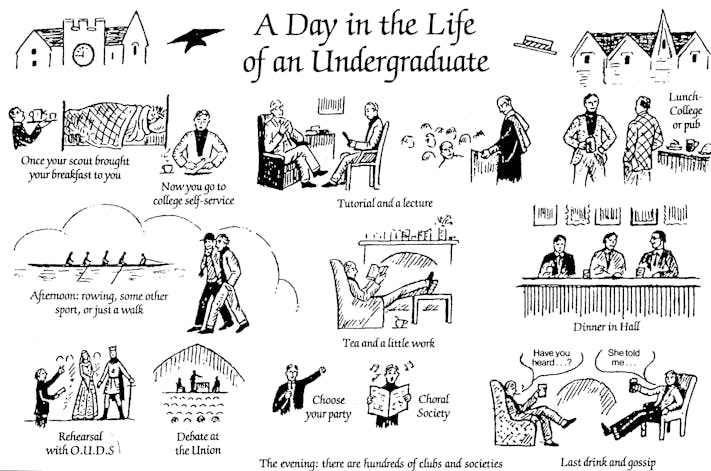A Day in the Life of an Undergraduate

We suspect Mary Potter's cartoon was no longer really true even at the time it was drawn! It has never been true for many science subjects, whose students are frequently in lectures and labs all day, and have to cram their rowing in before breakfast. But it reflects more leisured times than these, summed up by Cousin Jasper's advice to Charles Ryder in Brideshead Revisited:
"You want either a First or a Fourth. [Fourths are no longer awarded.] There is no value in anything in between. Time spent on a good second is time thrown away... Clothes. Dress as you do in a country house. Never wear a tweed coat and flannel trousers - always a suit. And go to a London tailor; you get better cut and longer credit... Clubs. Join the Carlton now now and the Grid at the beginning of your second year. If you want to run for the Union - and it's not a bad thing to do - make your reputation outside first, at the Canning or the Chatham, and begin by speaking on the paper... and keep clear of Boar's Hill."
Times have changed and student life in Oxford these days is an altogether more earnest affair. Certain aspects, however, survive passing social fashions.
One is the disappearance of all one's colleagues in the hours between lunch and tea. It is essential to find oneself an occupation at this time, even if it is only a practical in the labs.
Another is the emergence of the same 'types' in each generation. The main categories are as follows. The 'Gnomes' stick to their books, perform spectacularly in exams, and are rarely heard of again. The 'Hearties' are good college men, who row and play rugger incessantly between bouts of rowdy beer drinking, and regard their fellows with a contempt which is returned in full. They are not noted for academic prowess, and more often than not lead their later lives in obscurity.
A type that is often successful academically and in life, is the 'Political Animal', who usually holds high office in the Oxford Union. Margaret Thatcher was one, in her time at Somerville. As a female undergraduate in the 1940s she was barred from membership of the Union, but she became the first woman president of the Oxford University Conservative Association.
The coffee-drinking, guitar playing, proselytizing 'God-Squad' has recruits from throughout the academic spectrum.
Most colourful are the 'Aesthetes' epitomised by Sebastian in Brideshead Revisited and by Oscar Wilde in history. The real thing is not to be confused with cheap imitations. Outrageous in dress and behaviour, they display a more subtle courage than the blustering hearties, and are often notorious in later life. Many organ scholars seem to fit into this type.
Finally, it is to be hoped that increased bureaucracy in selection procedures has not deprived us of the Gifted Misfit, who, while he may fail altogether to get a degree, absorbs the true flavour of the place, and lives to tell the tale. John Betjeman is the prime example.
The real great thing about Oxford University, still, is that there is a niche for just about everyone. A glance at the OUSU Handbook will reveal some 300 University clubs, devoted to everything from Cheese Appreciation, through the arts, sport and politics, to the OU Trivial Pursuit Society. And if there is an "Oxford Type" it's someone with more than one string to their bow - who may be the under 15s trampolining champion while reading History, a keen politician reading Chemistry, or just doing the lighting for a play every week while studying Biochemistry on the side.



